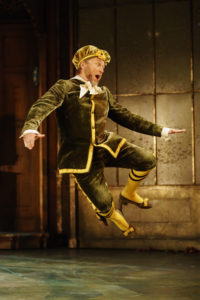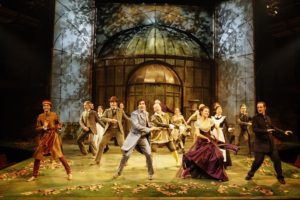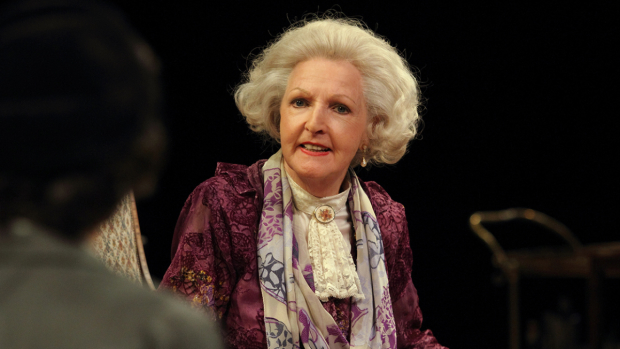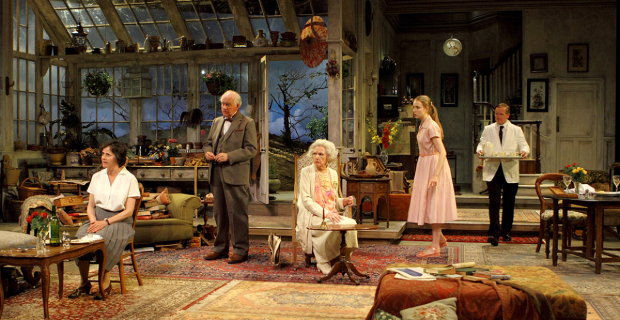Adrian Edmonson’s comic turn stands out in Shakespearean farce
★★★★

In case you get confused with Shakespeare’s comedies, Twelfth Night is the one with a woman disguised as a man and much mistaken identity. That doesn’t narrow it down that much? Okay, it’s the one with the shipwreck at the beginning. Still too many to choose from? Well, this is the one where Malvolio is tricked into wearing yellow garters. Now, you’ve got it. That’s what we all remember. Which is a shame, in a way, because the main plot concerns quite a profound comedy about the meaning of love.
In this 2017 a moviueproduction, director Christopher Luscombe has chosen to go with the crowd and ramped up the farce. Olivia’s puritanical steward is played by Adrian Edmonson, still best known for The Young Ones. He has a wonderful comic range from displeasure (liked he’s sucked a lemon) to swaggering pomposity (bouncing around the stage like a demented rabbit) to abject misery.
He is a total delight (as he was in The Boyfriend) but so are the ageing delinquents who set him up for a fall. John Hodgkinson as Sir Toby Belch is a predatory con artist with some unpleasantly sneering looks. Michael Cochrane as Sir Andrew Aguecheek, while not as thin as you might expect, delivers his lines with a bright-eyed naivety and has an impressive sprightliness. (He plays Oliver in The Archers by the way.) Vivien Parry as the scheming Maria and Sarah Twomey as Fabia, traditionally a male part, also play their roles well.
Sir Toby’s very loud and long lasting flatulence sets the tone early on. In fact, like much of the plot, there are times when the physical comedy is ludicrous. As Malvolio reads the fake letter purportedly from Olivia, the conspirators get so close to him, it’s impossible he wouldn’t see them. It is, as I say, ludicrous, but also very funny.
Running alongside the farce is a comic love story woven around a woman disguised as a young man. Count Orsino, who seems in love with the idea of being in love, is infatuated with Viola (in male guise), whilst continuing to pursue the grieving Olivia who has sworn off men. Olivia then falls in love with the apparently male Viola who in turn lost her heart to Orsino. From then on, we’re just waiting for Viola’s twin brother Sebastian to turn up for typical Shakespearean mix ups and misunderstandings.

Here’s a difference between film and theatre. In a movie, we would expect Sebastian and Viola to be identical but in the theatre, we’re used to suspending disbelief. However, this filmed production with its close-ups makes the lack of similarity very obvious.
Needless to say, all’s well that ends well- oh no, that’s a different play. This production’s sing-song at the curtain call makes Shakespeare’s happy ending even happier. Possibly a little too happy, in that there’s little room for the undercurrent of pathos in Twelfth Night.
For any production to succeed, Viola must be lovable, because we must believe she can ignite feelings in both Orsino and Olivia, so crucial to the central plot. In Dinita Gohil the RSC production has such an actor. She is without question a delight to look at and listen to in her acting of this character.
I have some reservations about the people who fall in love with Viola. I’m not questioning the emphasis placed in this production on sexual ambiguity, which is there in the text. No, for me, the problem is, when Ms Gohil disguises herself as a male, she is more boy than man. This is partly a problem with the play itself: reference is repeatedly made to the young man’s inability to grow a beard.
Nicholas Bishop as Orsino and Kara Tointon as Olivia are both, I think, in their early thirties. In any case, I found it a little discomforting to see these mature people desiring such a boyish young man. To be fair, Kara Tointon does carry it off by behaving skittishly and I did like the way she portayed Olivia’s confusion and infatuation. On the other hand, Nicholas Bishop’s Orsino – and this is not the fault of the actor- comes across as silly and a bit pervy.

This is a good looking production. Kara Tointon’s dresses, designed by Simon Higlett, are beautiful. As is his set. It’s hard to appreciate fully on a screen but you can see that it’s colourful and exotic and clearly shows the Victorian British fascination with India- another theme of this production.
I think the greatest tribute I can pay to this recording is that it really made me wish I had seen it live.
You can watch Twelfth Night on marquee.tv, where there are lots of other great RSC productions including Paapa Essendieu’s Hamlet, David Tennant’s Richard II and Anthony Sher’s King Lear. At the time of writing, Marquee TV are offering a 14 day free trial.

